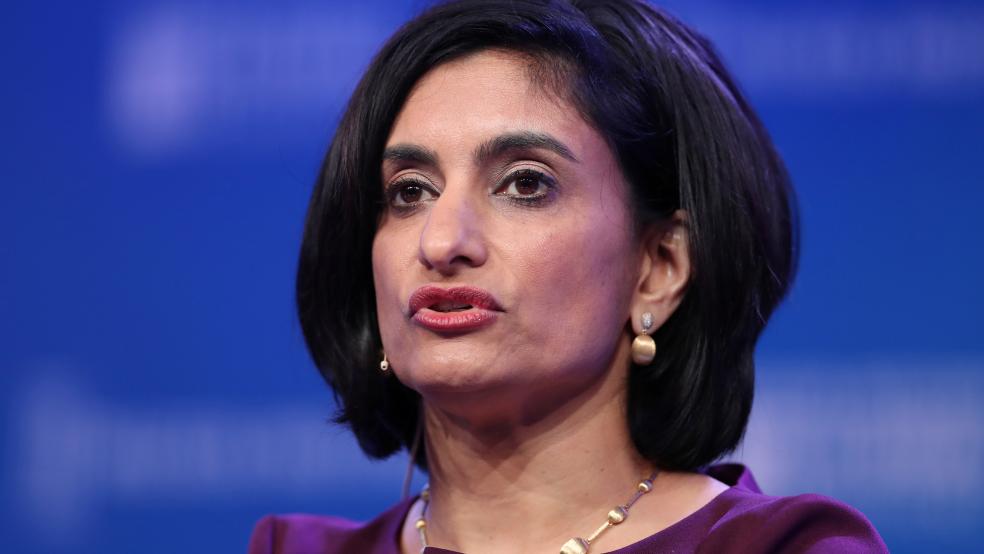Seema Verma, the Trump administration’s top Medicaid official, Tuesday sharply attacked critics of her plan to force some Medicaid enrollees to work, a policy that led to thousands of people losing coverage in Arkansas.
“We cannot allow those who prefer the status quo to weaponize the legal system against state innovation,” the administrator of the Centers for Medicare & Medicaid Services said in a fiery speech to the nation’s 56 state and territorial Medicaid directors in Washington, D.C.
A federal judge shut down the short-lived work requirement initiative in Arkansas and stopped it from launching in Kentucky last spring. Several states, including Indiana, Arizona and New Hampshire, that had won federal approval have put their implementation plans on hold pending an appellate court ruling.
Advocates for the poor argue work requirement policies are illegal and unfairly add hurdles to people who qualify for coverage in the federal-state health program.
But those opponents are seeking “to manipulate Medicaid into the prototype of a single-minded, single-payer nirvana — a utopia of open-ended government-run health care,” Verma said. “Part of my mission is to fight such underhanded tactics and preserve the right of states to shape your programs in ways that are consistent with the needs of your residents, your cultures and your values. Anything less stifles innovation.”
That would be “a disservice to the millions of people on Medicaid today and those who will need it in the years and decades to come,” she added.
The federal government has approved work requirement plans in 10 states and requests are pending from 10 others. Most of those initiatives are directed at the low-income adults who gained coverage through the Medicaid expansion initiated by the Affordable Care Act.
Verma first announced plans to open the door to work requirements in a speech to Medicaid directors in 2017.
Medicaid — like Medicare — is an open-ended entitlement program, which means federal funding increases as costs and enrollment rise.
In addition to doubling down on the controversial work requirements, Verma renewed her interest in letting states get Medicaid funding through a block grant system. Block grants would give states more flexibility to limit enrollment and enforce eligibility rules, she added.
Critics have said such a change would cut Medicaid funding, limit coverage, hurt beneficiaries and lead to lawsuits.
But Verma said CMS would soon publish guidance to states to allow them to get block grant funding for “certain optional adult populations.”
“Many states have expressed a willingness to be held accountable for improving outcomes in exchange for greater flexibility and budget certainty,” Verma said. “Block grants and per capita cap proposals are two such alternative financing approaches.”
Also Tuesday, CMS issued a proposed rule that would overhaul so-called supplemental payments that many states receive to help their hospitals, nursing homes and doctors get extra funding beyond those received when caring for Medicaid enrollees.
The federal government spent about $48.5 billion on such supplemental payments in 2016 for states.
The payments — as a share of total Medicaid fee-for-service expenditures for health providers — ranged from 1% in North Dakota to 65% in Tennessee, according to a Congressional Research Service report.
CMS and congressional investigators have said the payments allow states to game the system to help bring in additional revenue for these providers without showing how they spend the money.
“I recognize that these schemes often have their roots in self-interested providers, egged on by opportunistic consultants seeking to leverage regulatory loopholes or hide behind a lack of transparency,” Verma said. “I know that most state leaders want to make sure every dollar is supporting value and improving care for Medicaid beneficiaries, and those of you that are doing the right thing have nothing to worry about. We have your back.”
The supplemental Medicaid payment system has come under criticism for many years because of the lack of transparency at the state level. However, efforts to curtail the spending has faced pushback from states and providers fearful of losing dollars.
Matt Salo, executive director of the National Association of Medicaid Directors, said state officials are open to efforts to bring more transparency but they will be cautious about anything that severely reduces their funding.
“The challenge is, how do you do this in a thoughtful, real-world way?” Salo said. “We have to do it in a way that is achievable but that does not jeopardize patient care in the process.”
Verma acknowledged that the uninsured rate among children has grown in the past two years despite the strong economy. She said the solution is to lower health costs to make it easier for their parents to afford private coverage.
Patient advocates have blamed states’ efforts to tighten Medicaid eligibility as a leading factor in the drop in coverage.
Nonetheless, Verma said she would push states to further limit eligibility to make sure only those eligible are getting benefits.
“Lax eligibility practices jeopardize the sustainability of the program,” she said.
CMS will “ensure that states conduct timely redeterminations and make use of appropriate data sources to verify ongoing income eligibility.”
Salo said state Medicaid directors agree with the need for appropriate safeguards to make sure ineligible people are not getting assistance. But, he added, forcing enrollees to go through more steps to get and retain coverage will come at a cost of losing people who truly deserve help.
“You want government to work for people and want to create a system that if you are eligible it should be easy to get on,” he said. “And if you set barriers and hurdles, you will lose a lot of people who are eligible but could not deal with the paperwork.”



